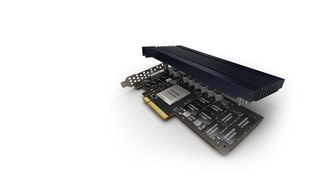Samsung wants to reduce core counts in storage servers with new SSDs
An SSD with two Ethernet ports

At this week's OCP Global Summit, Samsung disclosed more information about a new type of solid state drive (SSD) it's working on - one that only makes sense in a data center context, for now.
When it comes to flash memory, the most common configuration in data centers worldwide is JBOF (or just a bunch of flash), which uses NVMe SSD storage attached to PCIe switches, processors and NICs (network interface cards). There are two rather significant issues with this system, to do with the lack of scalability of the storage controller and limited bandwidth; a classic case of too many middlemen.
EBOF - or Ethernet SSD Bunch of Flash, as Samsung puts it - aims to solve this issue by putting the Ethernet ports (two of them for redundancy) on the SSDs themselves.
- Check out our list of the best portable SSDs available
- Here's our list of the best external hard disk drives of 2020
- We've built a list of the best rugged storage out there
These are not your usual Ethernet ports, however, as each supports a staggering 25Gbps - about 25x what most Gigabit interfaces can achieve. Unsurprisingly, that's only available in a standard SSD (i.e. 2.5-inch), rather than the smaller M2 form factors.
Samsung claims the E-SSD drive will achieve PCIe Gen4x4 performance, or about 1500K IOPS at 4K random read. What’s even more spectacular, though, is that the performance of the drive scales in an almost linear fashion.
Based on the chart provided by the company, 24 NVMe drives will be about 7.5x faster than a single NVMe drive, whereas the same number of NVMe-oF SSDs will be about 23x faster than a single drive.
Samsung reached out to point out that the graph is not linear and not to scale. A spokesperson for the company added, "we have no specific data to publicly share at this time, but will say as we noted originally that the numbers you stated are not the numbers that we have".
Are you a pro? Subscribe to our newsletter
Sign up to the TechRadar Pro newsletter to get all the top news, opinion, features and guidance your business needs to succeed!
Removing the CPU, networking and other bottlenecks means lower latency, higher bandwidth, lower cost, better performance and potentially big TCO savings. Samsung added that "EBOF will be helpful to many in hardware procurement including networking vendors and OEMs".
- Here's our list of the best NAS drives and enclosures on the market

Désiré has been musing and writing about technology during a career spanning four decades. He dabbled in website builders and web hosting when DHTML and frames were in vogue and started narrating about the impact of technology on society just before the start of the Y2K hysteria at the turn of the last millennium.
